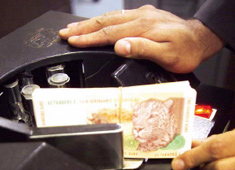SA's billion-rand tax bonanza
4 April 2006
The South African Revenue Service (Sars) exceeded all expectations for the financial year just ended, collecting R418.1-billion by midnight on 31 March - R1-billion more than February's revised estimate and R45-billion above the original February 2005 estimate.
According to Business Day, the revenue collection overrun is expected to reduce the budget deficit - the difference between government's total expenditure and its total receipts, excluding borrowing - to 0.3% of gross domestic product (GDP).
This would give South Africa its smallest fiscal deficit in over 25 years. According to Business Day, the 2005/06 fiscal deficit was 0.5% of GDP, the second-lowest in the country's history after the 0.1% reached during the gold boom in 1980.
Releasing the year-end figures in Pretoria on Monday, Finance Minister Trevor Manuel said the preliminary revenue result gave further credence "to the mood of optimism and confidence in the country and our ability to fund our ambition for a better life for all South Africans."
South Africa and its people, Manuel said, were now "reaping the rewards of an upbeat economy, improved tax compliance and civic responsibility and a steadily improving tax and customs administration."
According to the SA Press Association (Sapa), Manuel said the original estimate made in February 2005 was based on macroeconomic assumptions that changed during the year, with the economy doing much better that the assumption predicted.
"One of the consequential benefits was an acceleration of commercial activity on the supply of goods and services on the back of an increased consumption demand. This resulted in an increase in gross domestic product, imports, gross operating surpluses and gross domestic expenditure."
According to Sapa, corporate income tax performed well above expectations, with R88.79-billion being collected. Secondary tax on companies delivered R12.5-billion, R414-million more than estimated.
Transfer duties came in below target at R8.51-billion of an expected R8.7-billion, while excise duties and ad valorem delivered R15.72-billion and the fuel levy R20.9-billion.
Personal income tax also came in below target, Sapa reports, with R125.4-billion of the estimated R126.46-billion being collected.
Manuel told Sapa that he believed Sars would probably continue collecting more than was estimated. "We still do not know where the limits are," he said, adding that the figures spoke "of an organisation that functions, and a system that works."
SouthAfrica.info reporter
|














